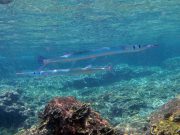Diving with Needlefish
Lanta Marine Life | Belonidae
Needlefish are long, slender fish, up to 1.5m in length and comprise up to 34 individual species. They can be found at all sites when diving Koh Lanta, with the most distinctive feature being the long, narrow beak, which houses multiple sharp teeth. They have a single dorsal fin, located to the rear of the bosy, close to the anal fin.
These fishes live at the surface and are protectively colored for this mode of life by being green or blue on the back and silvery white on the lower sides and belly. They often have a dusky or dark blue stripe along their side
In most species, the upper jaw only reaches its full length in adults, so the juveniles have a half-beak appearance, with an elongated lower jaw, but a much smaller upper one. During this stage of their lifecycle, they eat plankton, switching to fish once the beak fully develops.
All needlefish feed primarily on smaller fishes, which they catch either sideways in their beaks, or with an upward sweep of their heads. In addition, some species also take krill, swimming crustaceans, and small cephalopods.
Needlefishes can leap at the surface at speeds of up to 60km per hour, and some people have been injured when accidentally struck by them, particularly at night when the fishes are attracted by lights.
1 species found on this page:
Crocodile Needlefish
(Tylosurus crocodilus)
Crocodile Needlefish (also called the houndfish) are the largest members of its family, growing up to 1.5 m in length 6.4 kg in weight.
The jaws are extremely long, almost 1.5 times the length of the head, forming a stout beak with very sharp teeth. Front teeth point forward in juveniles. This fish can also be identified by the nasal pit located in front of the eyes.

Tylosurus crocodilus @ Koh Bida
The body colour is generally a dark bluish green above, silvery white below. The tail fin is deeply forked, with the lower lobe (fork) being much longer than the upper fork.
A female Crocodile Needlefish may produce 30,000 eggs which are fertilised externally. The eggs have tendrils which allow them to attach to objects in the water.
These fish are usually observed in small schools and are capable of jumping out of the water when they are startled or attacked. They favour doing so from the dark into the light.
Diving with Needlefish around Koh Lanta
Scuba Diving & Snorkel Trips
If you'd love a chance to spot Needlefish on one of our daily high season diving trips from Koh Lanta then send us an email to info@diveandrelax.com.
Join our high season speedboat dive trips to some of Thailand's best dive sites and enjoy small groups, short journey times, with a focus on great personal service, safety and fun.
Not yet a certified diver? Learn to Scuba Dive on Koh Lanta with the 3 day SSI Open Water Diver course.
Book online to save 10% on dive trips and scuba courses on Koh Lanta.
Find Out More
Indo-Pacific Marine Life Guides
- Allen, G., Steene, R., Humann, P., DeLoach, N. (2003) Reef Fish Identification, Tropical Pacific. Jacksonville, FL., USA: New World Publications, Inc., ISBN 1-878348-36-1.
- Humann, P., DeLoach, N., (2010) Reef Creature Identification, Tropical Pacific. Jacksonville, FL., USA: New World Publications Inc., ISBN 978-1-878348-44-9
- Debelius, H. (2013) Indian Ocean Reef Guide. Frankfurt, Germany: IKAN - Unterwasserarchiv, ISBN 978-3-939767-52-7.
- Debelius, H. (2004) Nudibranchs and Sea Snails, Indo-Pacific Field Guide. Frankfurt, Germany: IKAN - Unterwasserarchiv, ISBN 3-925919-51-1
- Erhardt, H., Knop, D. (2015) Corals Indo-Pacific Field Guide. Frankfurt, Germany: IKAN - Unterwasserarchiv, ISBN 3-925919-69-4.
- Veron J.E.N., Stafford-Smith M.G., Turak E. and DeVantier L.M. (2016). Corals of the World


